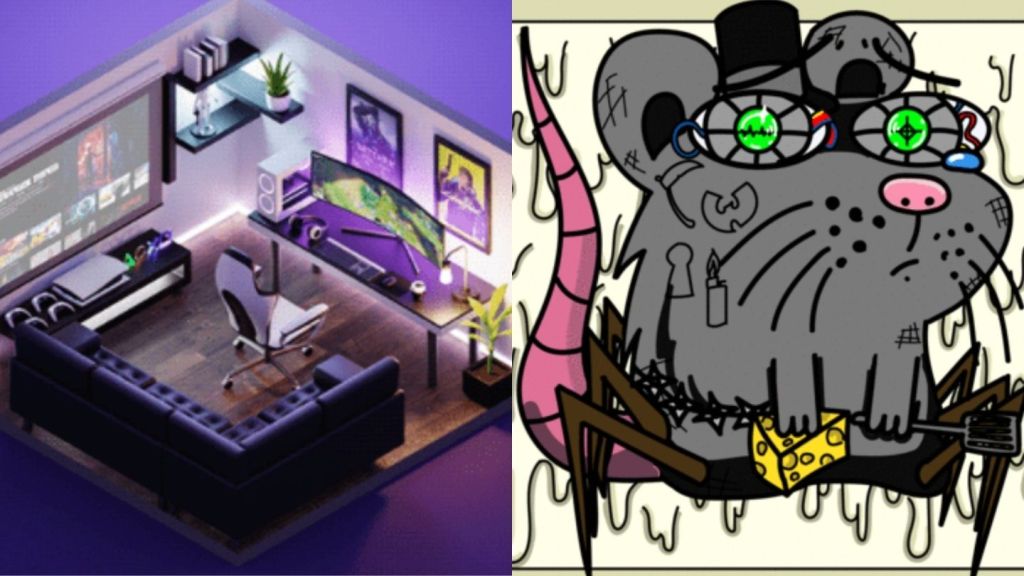The market for blockchain collectibles, or NFTs, is red hot. Predictably, the scammers have started moving in. Just days after the anonymous developer behind the NFT project Evolved Apes, known as Evil Ape, vanished with $2.7 million dollars, several more projects have shut down without warning and disappeared with the money.
So-called “rug pulls,” already common in the realm of cryptocurrencies, are proliferating among NFT projects. Typically, a developer will launch a project along with big promises to develop it further (perhaps into a game with blockchain-linked items), only to disappear with the funds gained from people minting their JPEGs on the blockchain.
Videos by VICE
On Wednesday the NFT-focused Solana blockchain was hit with at least four rug pulls, some occurring on the same day of their launch or soon after, to the tune of hundreds of thousands of dollars in cryptocurrency.
One project, Solana Towers, promised a grand metaverse vision of a bustling virtual condo that investors could buy rooms in via NFTs. The project’s roadmap specified an “initial NFT offering for early investors” would take place on Tuesday October 5, with the NFTs conferring a space in the virtual building and the ability to “receive revenue from the building” and “from all subsequent buildings.” The next step on the roadmap was “metaverse investment” in December, but the project never got that far. Solana Towers launched on Tuesday, and on Wednesday it was gone, along with its website, Twitter account, and Discord. Based on blockchain records from a wallet singled out in Discord screenshots posted to Twitter, 1,881 SOL ($282,150) was transferred on Tuesday, with more over the following days.
Other projects followed a similar trajectory. Interstellar Bots, another Solana-based NFT project, promised to run its first mint on Wednesday, with 5,000 tokens selling for 1 SOL. Instead of being offered on a marketplace, it would be run through a website. Interstellar Bots didn’t claim to offer much of anything beyond an interesting sci-fi background.
“The year is 2134. After almost a century of a long and exhausting war caused by the collapse of the financial system and the inevitable climate changes, humanity is now licking their wounds and trying to restore a peaceful society,” the website read before being taken down. “But something, or someone is looking at them very close. They are called Interstellar Bots and they are coming from a really far and unknown galaxy. What do they want and what’s theirs [sic] purpose?”
The question of what they wanted was answered on Wednesday. The project deleted its Twitter account and claimed it was locking down its Discord to “block scammers, fudders, and keep the discord clean,” according to screenshots shared on Twitter. One user looking at the project’s code found that it was set to “send 1 sol from you to them, very little else going on,” and noted it “could be a rug.” That user identified a target wallet which contained 324 SOL ($48,600) on Wednesday, and which has spent the past day transferring the balance to other wallets.
Cheesy Dizzy is another Solana-based NFT project that pulled the rug out from investors on Wednesday. Cheesy Dizzy featured drawings of mice with various outfits, items, and backgrounds, and launched its initial mint on September 17 with a starting price of 1 SOL per NFT. The project also had big plans, including being listed on a marketplace and according to Discord screenshots shared on Twitter, starting on Wednesday, buying back all Cheesy Dizzy NFTs under 1.5 SOL to keep the price floor high. That never happened. On Wednesday, the project’s website, Twitter account, and Discord all went dark. According to blockchain records of a wallet singled out by one Twitter user as having been sent funds from the project’s mint wallet, 421 SOL was transferred out on September 18, and another 16 SOL in the following days, for a total of $65,500.
Technidroids, another Solana project that officially launched on Wednesday with 500 editions at the price of 1 SOL (roughly $150 USD) per NFT, deleted its Twitter account and Discord soon after although its typo-ridden website is still live. Like many NFT projects, it consisted of drawings of characters (in this case robots) with ostensibly algorithmically-generated, yet hand-drawn, features. The project’s road map promised that after minting an initial run, it would be listed on a marketplace and create “NFT music” as well as Robotania, “the planet where you will have the possibility to use your Technidroids and play to earn.” It’s unclear how much this rug came away with.
It is hard to imagine there will be any stop to the rug pulling given the rise in popularity of not just cryptocurrency and crypto assets, but hyped-up NFT offerings taking place outside of established marketplaces as well as the anonymity enjoyed by some project founders. It’s not entirely clear what, beyond scrutiny of each project, can be done to bring an end to this. However, it’s likely that the NFT space will see a push for more “doxxed” teams, similar to the DeFi space after it became overrun with scams by anonymous developers.
“This kind of problem is inherent in the system, not just Solana but all crypto can fall victim to bad actors,” tweeted the user who examined Interstellar Bots’ code. “We could attempt to employ a more centralised approach with greater transparency but it goes against the grain.. Something we have to live with!”
Jordan Pearson contributed reporting.






